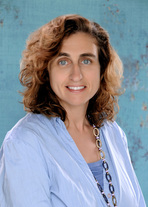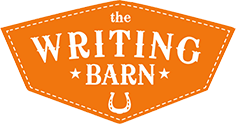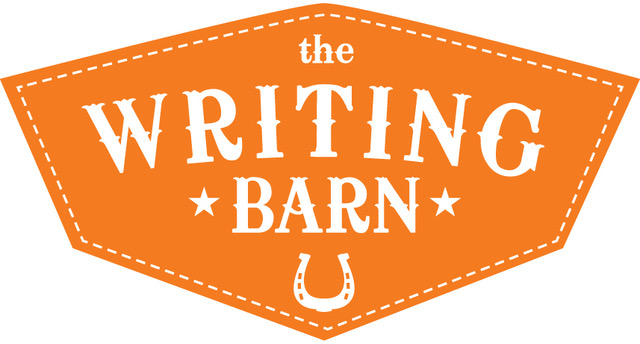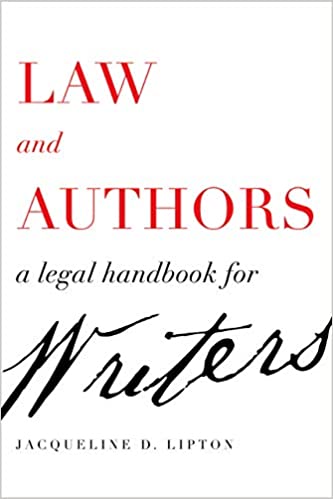Jacqui Lipton took some time to reflect on her experiences as a writer and a facilitator. Likewise, we get to celebrate the recent release of her book (see more about that below).
We’re honored to have Jacqui as a frequent educator here at the Writing Barn and we appreciate her dedication to uplifting and guiding other writers toward their goals!
Be sure to grab your copy of Law and Authors: A Legal Handbook here!
Please share your exciting news!
August 4, 2020, was the book birthday for Law & Authors: A Legal Handbook for Writers, published by Naomi Schneider’s imprint at University of California Press. I first started outlining the book sitting outside the Barn in the sunshine in October 2016 if I’m remembering correctly! I was visiting for a workshop with Kristen-Paige Madonia on YA novels and tucked into Law & Authors as a side project that had been noodling around in my mind for a while and that I discussed with others in the group as well as Bethany and Kristen-Paige while I was there. The outline I started at the Barn led to a full proposal which led to the perfect agent (Jane Dystel at DGBLM) which led to the perfect editor (Naomi Schneider at UCP).
How long have you been writing/pursuing an agent/publishing deal?
I’ve been writing off and on pretty much all my life (ever since I could hold a pen—just ask my dad), but I took a long break when I started my professional life as an attorney and law professor, and later went back to it when I had my first child in the early 2000s. I didn’t start seriously submitting manuscripts to agents/editors until around 2014 and had a lot of “near misses” with fiction projects, but everything fell into place with Law & Authors which married my interests in law and the business side of publishing with my love of writing and collaborating with creative artists.
What led you to the Writing Barn?
As a VCFA graduate from the MFA program in Writing for Children and Young Adults, I had heard a lot about Bethany (a fellow grad), but had never had the opportunity to meet her before I started looking into programming at the Writing Barn. When one of my advisors in the MFA recommended Kristen-Paige’s workshop, I had to check it out and I’m very glad I did. I made some great friends in that workshop who I’m still in touch with today, and the supportive atmosphere and–dare I say it–peace and quiet, gave me the physical and mental space I needed to get started on a project I’d cared about for a long time but never given myself permission to write.
How did the WB programming aid you in the craft and business of writing?
As I said above, the Barn (and Bethany) had a lot to do with the sense of “giving myself permission” to write a book that I cared a lot about but really didn’t know if it would be of interest to anyone else. Talking to Bethany and others about legal issues they wish they’d known about when they started out, and about how other creative people would probably be interested in learning more about the law, was probably the kick in the butt I needed to finally put pen to paper.
The opportunity for me to teach the occasional webinar on legal issues for creatives at the Barn has also been immensely helpful in framing the issues in the book to focus on the legal challenges most pertinent to today’s writers and in presenting those topics in a way that’s (hopefully) accessible to those who need the information.
How did the atmosphere of The Writing Barn aid you in achieving these goals?
The ongoing discussions about business and craft since that first workshop have been both inspirational and also grounding in the best ways—talking to folks at the Barn, and through Writing Barn connections, has helped me to keep my finger on the pulse of what I needed to include in the book and how authors can best find help and support for related business issues.
What is a takeaway you will carry with you far beyond this good news as you continue to build and develop your career?
Anyone who knows me knows that these days I don’t see myself primarily as an author, but more as someone who helps other authors build their careers, so I tend to watch the Writing Barn website closely for programs and information I can share with clients at my own agency and author friends!
In terms of takeaways that have helped me, I think the Barn really helped me thinking about ways to look laterally at a writing career—looking at the writing process from different angles (the creative spark, editing/revision, business, and marketing aspects, etc). Often it seems that authors get confused between these different areas like thinking too much about “market” issues when they’re playing around with early drafts and should ideally let themselves be freer to create.
I know on the legal side, a lot of writers use the law as an excuse not to give themselves permission to write the story they want to write e.g. “My sister would sue me if I wrote my memoir so now I need to study defamation law instead of writing my book.” A takeaway for me from working with other writers at the Barn has been to get to know the different parts of your “author brain” and when you’re in “creative” mode, perhaps don’t let “editor brain” or “business brain” get in the way.
A writing career should ideally be a long term deal. Everyone has more than one story to tell so if you think about things in stages and let yourself be creative when you need to be, and business-y when appropriate, you’ll be able to play the long term game with a little less stress, maybe?
Any advice you have for writers and creatives having trouble staying the course in pursuing their goals?
See above!!
But seriously … I know it’s very easy to get frustrated when a project doesn’t feel like it’s clicking, or when a piece you love isn’t finding an agent, or if the agent can’t find the right editor. There are so many points in a career when it’s easier to give up than go on. After all, no one is begging for your book (most of the time). There are no real deadlines (until you actually have a contract).
Sometimes stepping away for a little while is a good idea; so you can come back with fresh energy and perspectives. Sometimes you have to fight through the resistance and force yourself to keep going. The right approach to take here really depends on knowing yourself as a writer and getting a sense of when you need fresh energy versus when you need to hold your feet to the fire. I often find that if I step aside and read a lot of books in the genres I love—maybe the genre I’m writing, but not necessarily—it gives me a fresh sense of energy for writing.
Often I’ll binge watch something on TV and subconsciously find my writer brain churning around the nuances of the story structure—this is great with series on Netflix, Hulu, etc with multi-episodes because the plot structures and character arcs can be so intricate and fun to parse out. There’s no one right answer other than “keep going”, but the bottom line is that if you’re truly a writer you don’t need me to tell you that.
You’ll find the more time you take away from the page, the more it beckons you, until ultimately you go back to that old project, or start a new one!
About Author Jacqui Lipton:
 Jacqui is a law professor and literary agent specializing in business and legal aspects of the publishing industry. She holds an MFA in Writing for Children and Young Adults from Vermont College of Fine Arts. In addition, she writes regular columns on legal and business issues for authors and artists for the SCBWI Bulletin, Luna Station Quarterly, Savvy Authors, and Catapult Community Magazine. She is also the author of the upcoming Law & Authors: A Legal Handbook for Writers (University of California Press, August 2020).
Jacqui is a law professor and literary agent specializing in business and legal aspects of the publishing industry. She holds an MFA in Writing for Children and Young Adults from Vermont College of Fine Arts. In addition, she writes regular columns on legal and business issues for authors and artists for the SCBWI Bulletin, Luna Station Quarterly, Savvy Authors, and Catapult Community Magazine. She is also the author of the upcoming Law & Authors: A Legal Handbook for Writers (University of California Press, August 2020).



My copy is winging its way to me right now! As someone who finds legalese confounding, I’m looking forward to having this on my shelf for reference. Thanks for writing the book, Jacqui!